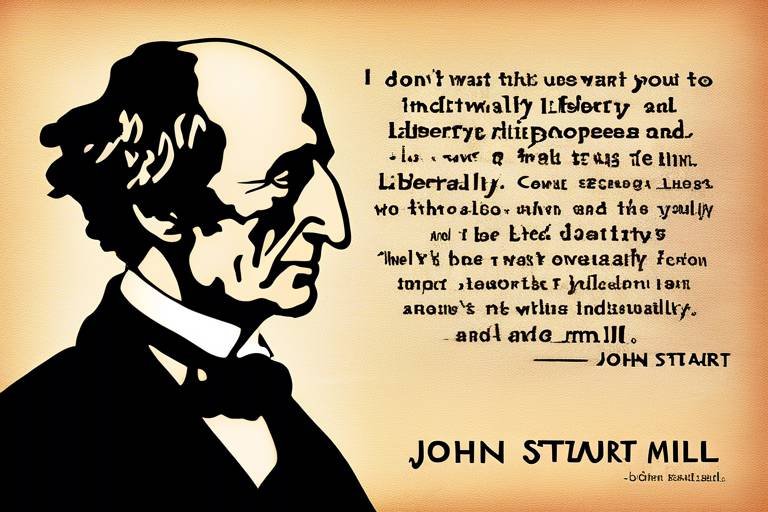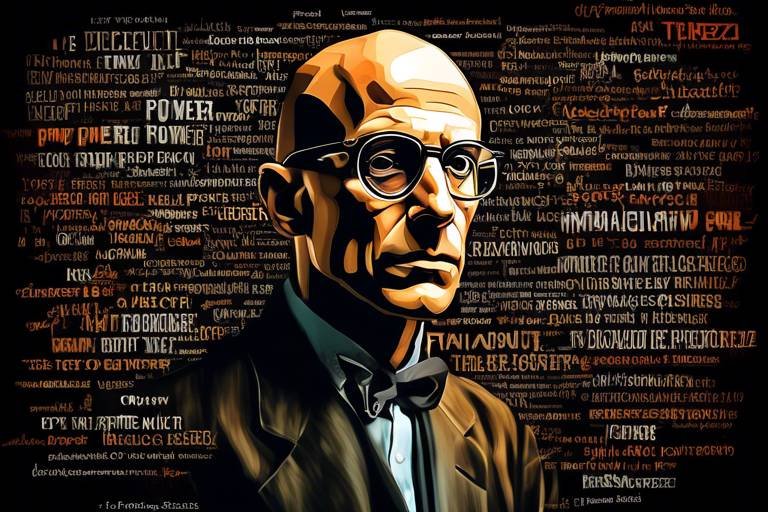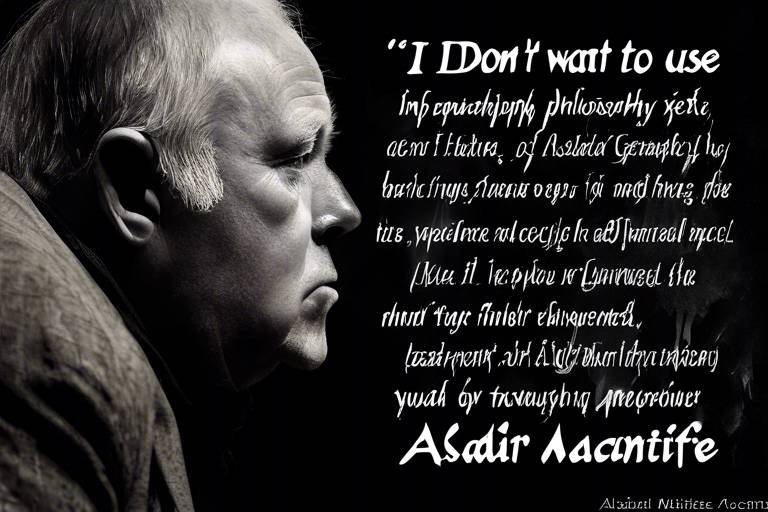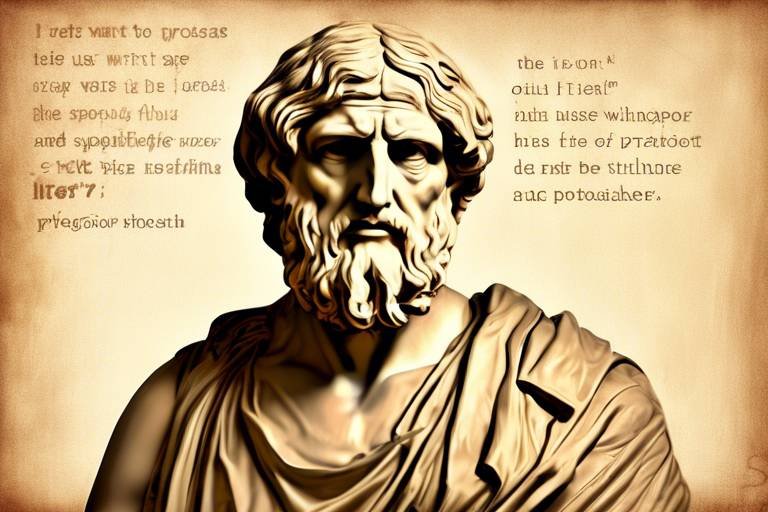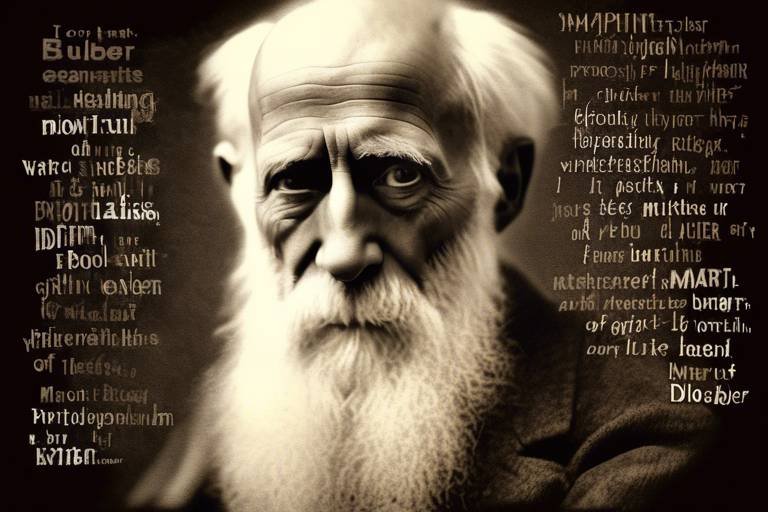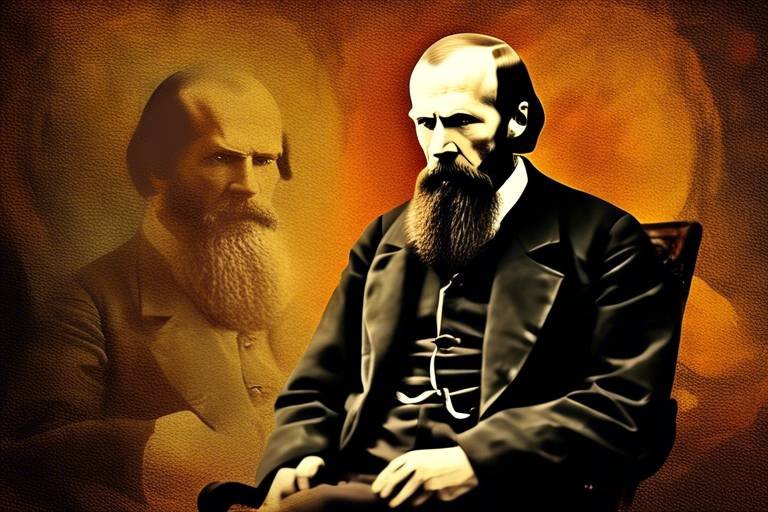Deconstructing the Philosophy of Alain de Botton
Alain de Botton, a contemporary philosopher, has a unique way of making complex philosophical ideas accessible to everyone. He dives deep into the intricacies of human experience, weaving together thoughts on love, work, happiness, and the essence of being human. His approach is not just about pondering life's big questions; it’s about applying these reflections to our daily lives. Imagine philosophy as a toolbox, filled with practical instruments that can help you navigate the often chaotic landscape of modern existence. De Botton’s philosophy invites us to pick up these tools and use them to build a more meaningful life.
One of the standout features of de Botton’s work is his ability to connect the dots between ancient wisdom and contemporary challenges. He doesn’t just regurgitate philosophical texts; instead, he translates them into a language that resonates with our everyday struggles and joys. For instance, he might take a profound idea from Stoicism and apply it to the pressures of social media, showing us how to cultivate resilience in a world that often feels overwhelming. This is where his brilliance lies—he makes philosophy not just interesting but also incredibly useful.
Moreover, de Botton emphasizes that philosophy is not reserved for the ivory towers of academia; rather, it is for everyone. He encourages us to engage with philosophical concepts in a way that feels personal and relevant. Whether it’s understanding the nuances of love or grappling with the meaning of work, de Botton’s insights help us to reflect on our experiences and find clarity in our thoughts and emotions. In essence, he demystifies philosophy, making it a vital part of our toolkit for navigating life.
As we delve deeper into de Botton’s ideas, we discover that he is not just a thinker but also a storyteller. His narratives often blend humor with profound insights, making his work relatable. He uses anecdotes and real-life examples to illustrate his points, allowing readers to see themselves in his stories. This narrative style not only engages the reader but also encourages a deeper connection with the philosophical themes he explores.
In the following sections, we will explore various aspects of de Botton’s philosophy, from the significance of love and relationships to the pursuit of happiness and fulfillment. Each theme will reveal the underlying philosophical principles that can help us lead more meaningful lives. So, buckle up as we embark on this enlightening journey through the mind of Alain de Botton!
Alain de Botton emphasizes how philosophy can provide practical guidance and insight into daily challenges, making it relevant and applicable to modern living.
De Botton's exploration of love highlights its complexities and the philosophical underpinnings that can help individuals navigate romantic relationships more effectively.
Emotional intelligence plays a crucial role in relationships, and de Botton discusses how philosophical insights can enhance our understanding of emotions and interpersonal dynamics.
De Botton advocates for empathy as a fundamental aspect of relationships, emphasizing its philosophical roots and importance in fostering deeper connections with others.
Conflict is inevitable in relationships, and de Botton provides philosophical strategies for addressing and resolving disputes constructively.
De Botton examines the relationship between work and personal fulfillment, offering philosophical perspectives that encourage individuals to find meaning in their professional lives.
Happiness is a central theme in de Botton's work, where he explores the philosophical dimensions of fulfillment and contentment in a modern context.
De Botton challenges conventional notions of success, urging individuals to consider alternative definitions that align with their personal values and aspirations.
The quest for meaning is a philosophical journey, and de Botton discusses how individuals can cultivate a sense of purpose in their lives through thoughtful reflection and action.
- Who is Alain de Botton? Alain de Botton is a contemporary philosopher known for his accessible approach to complex philosophical themes.
- What is the main focus of de Botton's philosophy? His philosophy focuses on applying philosophical insights to everyday life, particularly in areas such as love, work, and happiness.
- How does de Botton define success? De Botton challenges traditional definitions of success, advocating for personal values and aspirations to guide one's understanding of achievement.
- Why is emotional intelligence important in relationships? Emotional intelligence helps individuals understand and manage their emotions, fostering healthier and more empathetic relationships.

The Role of Philosophy in Everyday Life
Alain de Botton's perspective on philosophy is refreshingly accessible and profoundly relevant to our day-to-day experiences. He argues that philosophy is not just an abstract concept confined to dusty old books or the walls of academia; rather, it serves as a practical toolkit that can help us navigate the complexities of modern life. Imagine philosophy as a compass—a guide that helps us find our way through the often turbulent waters of our emotions, relationships, and career paths. By applying philosophical principles, we can gain clarity and insight into our everyday challenges, making the seemingly mundane aspects of life more meaningful.
De Botton emphasizes that philosophy should address the real issues we face, from dealing with heartbreak to finding fulfillment in our careers. He posits that by engaging with philosophical ideas, we can cultivate a deeper understanding of ourselves and the world around us. For instance, when faced with a difficult decision, instead of relying solely on gut feelings or societal expectations, we can turn to philosophical frameworks that encourage us to reflect on our values and priorities. This approach not only empowers us to make more informed choices but also fosters a sense of personal growth.
Moreover, philosophy can serve as a powerful tool for enhancing our emotional resilience. In times of stress or uncertainty, philosophical teachings can remind us of the impermanence of our struggles. By understanding that challenges are a natural part of the human experience, we can approach them with a sense of calm and perspective. De Botton encourages us to embrace the wisdom of thinkers like Epicurus, who taught that happiness comes from within and is often derived from simple pleasures rather than external achievements.
In addition, de Botton’s work highlights the importance of community and shared experiences in the philosophical journey. Engaging in discussions about philosophical ideas with friends or family can deepen our connections and foster a sense of belonging. It’s like sitting around a campfire—the warmth of shared insights and experiences creates a space for vulnerability and growth. This communal aspect of philosophy reminds us that we are not alone in our struggles and that seeking wisdom together can be a profoundly enriching experience.
Ultimately, the role of philosophy in everyday life is about transforming our perspective. By integrating philosophical insights into our daily routines, we can shift our mindset from one of mere survival to one of intentional living. Whether it's through journaling our thoughts, engaging in deep conversations, or simply pausing to reflect on our experiences, philosophy invites us to examine our lives critically and thoughtfully. In this way, it becomes a vital ingredient in the recipe for a fulfilling and meaningful existence.
- What is the main idea of Alain de Botton's philosophy?
Alain de Botton believes that philosophy should be practical and applicable to everyday life, helping individuals navigate personal challenges and find meaning in their experiences.
- How can philosophy help in relationships?
Philosophy provides insights into emotional intelligence, empathy, and conflict resolution, which are essential for building and maintaining healthy relationships.
- What role does philosophy play in personal fulfillment?
Philosophy encourages individuals to redefine success and pursue meaning, leading to a more fulfilling and purposeful life.

The Importance of Love and Relationships
When we think about love, it often feels like we’re trying to navigate a labyrinth without a map. Alain de Botton, a contemporary philosopher with a knack for making complex ideas digestible, dives deep into the intricacies of love and relationships. He argues that love isn’t just a spontaneous feeling; it’s a complex interplay of emotions, expectations, and philosophical reflections that can guide us through the maze of human connection. This is crucial because, let’s face it, relationships can be both beautiful and bewildering. So, how can philosophy help us in our quest for meaningful connections?
De Botton emphasizes that understanding the philosophical underpinnings of love allows us to approach our relationships with a clearer mindset. Instead of succumbing to the fairy-tale narratives often portrayed in movies and books, he encourages us to recognize that love requires work, patience, and a willingness to grow together. He posits that by embracing the realities of love, we can cultivate deeper and more fulfilling relationships. This perspective can be a game-changer, especially when faced with the inevitable ups and downs of romantic partnerships.
One of the key aspects of de Botton’s philosophy is the idea of emotional intelligence. He asserts that being emotionally intelligent is essential for understanding not just our own feelings, but also those of our partners. It’s like having a secret weapon in the realm of relationships. By honing our emotional intelligence, we can navigate the complexities of love more effectively. This means recognizing when our partner is upset, understanding the underlying reasons for their emotions, and responding with empathy rather than defensiveness.
Emotional intelligence is not just a buzzword; it’s a vital skill that can transform how we interact with our loved ones. De Botton suggests that being aware of our emotional states and those of others can significantly enhance our relationships. Imagine being able to sense when your partner is feeling overwhelmed or anxious, and instead of brushing it off, you take a moment to listen and support them. This level of awareness fosters a sense of safety and understanding, paving the way for deeper connections.
Empathy is at the heart of every successful relationship. De Botton argues that cultivating empathy is not merely about sympathizing with someone; it’s about stepping into their shoes and experiencing their emotions. This philosophical insight can lead to a profound sense of connection. When we understand what our partners are going through, we can respond in ways that truly resonate with them. Think of empathy as the glue that holds relationships together, making it easier to weather storms and celebrate joys.
Let’s be real: conflict is inevitable in any relationship. Instead of viewing it as a threat, de Botton encourages us to see conflict as an opportunity for growth. He provides philosophical strategies for addressing disputes constructively. For instance, he suggests that we should approach conflicts with curiosity rather than hostility. By asking open-ended questions and seeking to understand our partner’s perspective, we can turn potential arguments into productive discussions. This shift in mindset can lead to healthier resolutions and a stronger bond.
In conclusion, Alain de Botton’s exploration of love and relationships offers invaluable insights that can transform how we connect with others. By embracing emotional intelligence, fostering empathy, and viewing conflict as a chance for growth, we can navigate the complexities of love with greater ease. So, the next time you find yourself in a relationship dilemma, remember that philosophy isn’t just for the ivory tower; it can be your guide in the beautiful, messy journey of love.
- What is Alain de Botton's main philosophy about love? De Botton believes that love requires understanding, emotional intelligence, and effort, rather than just romantic notions.
- How can emotional intelligence improve my relationships? By being aware of your feelings and those of your partner, you can communicate better and respond more empathetically.
- What role does conflict play in relationships? De Botton suggests that conflict can be an opportunity for growth and understanding if approached with curiosity.

Understanding Emotional Intelligence
Emotional intelligence (EI) is more than just a buzzword; it’s a crucial skill that can significantly enhance our relationships and overall well-being. Alain de Botton delves into the essence of EI, explaining how it intertwines with our philosophical understanding of emotions and interpersonal dynamics. Imagine navigating the complex waters of relationships with a map that not only shows you where to go but also helps you understand the currents and tides. That’s what emotional intelligence does for us—it equips us with the tools to read emotional signals and respond appropriately.
At its core, emotional intelligence involves recognizing our own emotions and the emotions of others. De Botton suggests that by cultivating this awareness, we can foster more meaningful connections. Think of it as tuning into a radio station; if you’re not on the right frequency, you’ll miss out on the rich, clear sound of human interaction. Being emotionally intelligent means being able to pick up on the subtle cues that often go unnoticed—like a friend’s sigh that hints at deeper issues or a partner’s smile that lights up the room. It’s about being present and responsive.
De Botton also emphasizes the importance of empathy as a cornerstone of emotional intelligence. Empathy allows us to step into someone else’s shoes, to feel what they feel, and to understand their perspective. This is not just a nice-to-have trait; it’s essential for building strong, resilient relationships. When we practice empathy, we create a safe space for others to express themselves, leading to deeper, more authentic connections. In this way, emotional intelligence becomes a bridge that connects us to others, fostering understanding and compassion.
To further illustrate the significance of emotional intelligence in our lives, consider the following key components:
- Self-awareness: Understanding your own emotions and how they affect your thoughts and behavior.
- Self-regulation: The ability to control impulsive feelings and behaviors, managing your emotions in healthy ways.
- Motivation: Harnessing emotions to pursue goals with energy and persistence.
- Empathy: The capacity to understand the emotional makeup of other people.
- Social skills: Proficiency in managing relationships and building networks.
These components work together to create a robust framework for understanding and improving our emotional intelligence. De Botton argues that by enhancing our EI, we not only improve our personal relationships but also our professional interactions. A workplace that values emotional intelligence is one where collaboration thrives, conflicts are resolved amicably, and everyone feels valued.
In conclusion, understanding emotional intelligence is not just about improving our relationships; it’s about enriching our lives. By engaging with our emotions and the emotions of others, we can navigate the complexities of human interaction with grace and confidence. As de Botton eloquently puts it, “The more we understand our emotions, the more we can connect with others in a meaningful way.” So, let’s embark on this journey of emotional discovery, unlocking the potential for deeper connections and a more fulfilling life.
What is emotional intelligence?
Emotional intelligence refers to the ability to recognize, understand, and manage our own emotions while also being aware of the emotions of others. It plays a critical role in how we interact and communicate with those around us.
Why is emotional intelligence important?
Emotional intelligence is important because it helps us build stronger relationships, navigate social complexities, and make informed decisions. It enhances our ability to empathize with others and respond to their emotional needs.
Can emotional intelligence be developed?
Yes, emotional intelligence can be developed through self-reflection, practice, and education. Engaging in activities that promote self-awareness and empathy can significantly enhance one’s emotional intelligence.
How does emotional intelligence impact professional success?
Emotional intelligence impacts professional success by improving teamwork, communication, and conflict resolution. Employees with high EI are often better at managing stress and adapting to change, contributing to a positive work environment.

Building Empathy and Connection
In a world that often feels fragmented and disconnected, building empathy and connection is more crucial than ever. Alain de Botton emphasizes that empathy is not just a nice-to-have quality; it is a fundamental aspect of human relationships that can transform our interactions and deepen our bonds with others. But what exactly does it mean to be empathetic? It's the ability to understand and share the feelings of another person—essentially, putting ourselves in their shoes. This process involves more than just sympathy; it requires a genuine effort to grasp another person's emotional experience.
De Botton suggests that one of the most effective ways to cultivate empathy is through philosophical reflection. By considering the shared human experience, we can recognize that everyone has their struggles and triumphs. This realization can foster a sense of connection, reminding us that we are all part of a larger tapestry of life. Imagine walking through a crowded street; each person you pass has their own story, their own battles. When we take a moment to acknowledge this, we create a bridge of understanding between ourselves and others.
Furthermore, de Botton argues that practicing empathy can lead to more meaningful relationships. When we connect with others on a deeper level, we open ourselves up to richer interactions. Here are a few strategies de Botton highlights for enhancing empathy:
- Active Listening: Pay attention to what others are saying without formulating a response in your mind. This shows that you value their perspective.
- Ask Questions: Engage with others by asking open-ended questions that encourage them to share their feelings and experiences.
- Reflect on Your Own Emotions: Understanding your feelings can help you relate better to the emotions of others.
By integrating these practices into our daily lives, we can create a ripple effect of empathy that enhances not only our relationships but also our communities. When we choose to connect with others empathetically, we contribute to a culture of understanding and compassion. As de Botton beautifully puts it, “To love and be loved is to feel the sun from both sides.” This quote encapsulates the essence of empathy—it’s about mutual understanding and shared warmth.
In conclusion, building empathy and connection is a philosophical endeavor that can lead to profound changes in how we relate to one another. By embracing the insights of Alain de Botton, we can cultivate a more empathetic approach to our relationships, ultimately enriching our lives and the lives of those around us. So, the next time you find yourself in a conversation, remember to listen, reflect, and engage with the heart. After all, empathy is not just a skill; it’s an art form that can transform our world.
Q: What is empathy?
A: Empathy is the ability to understand and share the feelings of another person. It involves recognizing their emotional experiences and connecting with them on a deeper level.
Q: How can I become more empathetic?
A: You can become more empathetic by practicing active listening, asking open-ended questions, and reflecting on your own emotions to better understand others.
Q: Why is empathy important in relationships?
A: Empathy fosters deeper connections, enhances communication, and helps resolve conflicts, making relationships more meaningful and fulfilling.

Navigating Conflict in Relationships
Navigating conflict in relationships can often feel like walking a tightrope. One wrong move, and you might find yourself tumbling into a pit of misunderstandings and hurt feelings. But what if I told you that conflict doesn’t have to be a disaster? Alain de Botton, with his unique philosophical lens, offers insights that can transform how we approach disagreements. Rather than viewing conflict as a threat, we can see it as an opportunity for growth and deeper understanding.
At the heart of de Botton's philosophy is the idea that conflict is an inevitable part of any relationship. Whether it’s a minor disagreement about what to have for dinner or a more significant issue like financial stress, conflicts arise from the very nature of human interaction. We all come from different backgrounds, have unique perspectives, and bring our own emotional baggage to the table. This diversity can lead to friction, but it can also enrich our relationships if we handle conflicts wisely.
De Botton suggests that the key to navigating conflict lies in our ability to communicate effectively. He emphasizes the importance of active listening. This means not just hearing the words your partner is saying but truly understanding their feelings and perspectives. When you listen actively, you create a safe space for open dialogue. It’s like tuning into your favorite radio station; you need to adjust the dial to catch the right frequency. In relationships, this frequency is empathy.
Moreover, de Botton highlights the role of self-reflection during conflicts. Often, our reactions are influenced by past experiences and unresolved issues. By reflecting on our triggers and emotional responses, we can approach conflicts with a clearer mind. Imagine trying to solve a puzzle while blindfolded; it’s nearly impossible. Self-reflection removes the blindfold, allowing us to see the bigger picture and understand the root causes of our conflicts.
When conflicts arise, de Botton encourages couples to adopt a mindset of curiosity rather than defensiveness. Instead of jumping to conclusions or preparing to defend your position, ask questions. This could look like, “Can you help me understand why you feel that way?” or “What are your thoughts on how we can resolve this?” By fostering a sense of curiosity, you invite your partner into a collaborative problem-solving process rather than a confrontational battle.
Another crucial element in navigating conflict is the ability to apologize and forgive. De Botton believes that acknowledging our mistakes and expressing genuine remorse can heal wounds and restore trust. It’s essential to remember that an apology is not a sign of weakness; rather, it’s a testament to your commitment to the relationship. Forgiveness, on the other hand, is equally vital. Holding onto grudges only weighs down the relationship. Think of it like carrying a backpack filled with rocks; it’s exhausting and unnecessary. Letting go of past grievances lightens the load and creates space for love and understanding.
Lastly, de Botton emphasizes the importance of setting aside time for constructive discussions. Life can be hectic, and it’s easy to let conflicts simmer under the surface. However, scheduling regular check-ins can help address issues before they escalate. These discussions should be approached with a spirit of collaboration rather than confrontation. It’s about working together to find solutions, much like a team brainstorming ideas for a project. With the right approach, conflicts can become stepping stones to a stronger, more resilient relationship.
- How can I improve communication during conflicts?
Focus on active listening, ask open-ended questions, and express your feelings calmly. - What if my partner is not willing to engage in constructive conflict resolution?
Encourage them to share their thoughts and feelings, and suggest seeking professional help if needed. - Is it normal to have conflicts in a relationship?
Yes, conflicts are a natural part of any relationship and can lead to growth if handled properly. - How can I build empathy with my partner?
Practice active listening, try to see things from their perspective, and share your feelings openly.

Philosophy of Work and Career
Alain de Botton's exploration of the dives deep into the often-overlooked connections between our professional lives and our sense of self-worth. In a world that frequently equates our job titles with our identities, de Botton challenges us to reconsider what it truly means to work. He invites us to reflect on the motivations behind our career choices and the impact they have on our overall happiness and fulfillment. After all, when was the last time you paused to think about why you do what you do?
At the heart of de Botton's philosophy is the idea that work should not merely be a means to an end—a paycheck or a stepping stone to a higher status. Instead, he argues that work can be a source of meaning and purpose. This perspective encourages individuals to seek roles that resonate with their personal values and passions rather than just following societal expectations. Imagine waking up each day excited to contribute to something you genuinely care about; that’s the kind of fulfillment de Botton advocates for.
Moreover, de Botton emphasizes the importance of understanding the emotional landscape of our careers. He posits that many of us experience a disconnect between our jobs and our inner selves, leading to feelings of dissatisfaction and burnout. To combat this, he suggests that we cultivate a deeper awareness of our emotional responses to work. Are we feeling challenged, bored, or unappreciated? By recognizing these feelings, we can take proactive steps to align our work with our emotional needs.
To illustrate his points, de Botton often references real-life examples and stories that resonate with many of us. For instance, he discusses the concept of the “career ladder”, a metaphor that suggests a linear progression in our professional lives. However, he argues that life isn’t always a straight climb; sometimes, we need to take a step back or even change directions entirely. This perspective liberates us from the pressure of constant advancement and allows for a more holistic view of our career journeys.
In addition, de Botton encourages us to embrace the imperfections and struggles that come with work. He reminds us that failure is not just a possibility but a part of the process. By reframing our relationship with failure, we can transform it into a learning opportunity rather than a source of shame. This shift in mindset can lead to greater resilience and a more fulfilling career path.
Ultimately, de Botton’s philosophy on work and career is about finding balance. It’s about recognizing that while our jobs can provide us with financial stability, they should also enrich our lives in more profound ways. By pursuing work that aligns with our values and fosters our emotional well-being, we can create a career that not only pays the bills but also brings us joy and satisfaction.
In conclusion, Alain de Botton’s insights challenge us to rethink our approach to work. Instead of viewing our careers as mere obligations, we can see them as opportunities for growth, connection, and fulfillment. So, the next time you sit down at your desk or log into your work account, ask yourself: Is this work truly fulfilling me?
- What is the main idea behind de Botton's philosophy of work?
De Botton emphasizes that work should provide meaning and purpose rather than just a paycheck. He encourages individuals to align their careers with their personal values. - How can I find fulfillment in my career?
Reflect on your passions and values, seek roles that resonate with them, and embrace the learning opportunities that come with challenges and failures. - What role does emotional intelligence play in our careers?
Understanding and managing your emotions can enhance your work experience, helping you navigate challenges and build better relationships with colleagues.

Understanding Happiness and Fulfillment
When we think about happiness, it often feels like an elusive butterfly, fluttering just out of reach. In his insightful works, Alain de Botton dives deep into the philosophical underpinnings of happiness and fulfillment, illuminating how these concepts are not just abstract ideas but integral parts of our everyday lives. He argues that true happiness is not found in the fleeting pleasures of material possessions or societal accolades but rather in a profound understanding of ourselves and our relationships with others. This perspective invites us to reconsider what it means to be happy in a world that often prioritizes superficial success and external validation.
De Botton encourages us to explore the philosophical dimensions of fulfillment, suggesting that happiness is a journey rather than a destination. This journey is shaped by our experiences, thoughts, and interactions. He posits that fulfillment arises from aligning our daily actions with our core values and aspirations. When we live authentically, we cultivate a sense of purpose that enriches our lives. It’s like planting a garden: the more care and attention we give to our values and goals, the more vibrant and fruitful our lives become.
Moreover, de Botton highlights the importance of self-reflection in understanding happiness. He suggests that taking the time to reflect on our desires, motivations, and the sources of our joy can lead to a deeper understanding of what truly fulfills us. This process is not always easy; it requires us to confront uncomfortable truths about ourselves and our lives. However, the rewards of such introspection can be profound, leading to a more meaningful existence.
In his exploration, de Botton also addresses the societal pressures that often distort our perceptions of happiness. We live in a culture that bombards us with images of perfect lives and unattainable standards, making it easy to feel inadequate. He challenges us to redefine our understanding of success and happiness by focusing on personal fulfillment rather than societal expectations. This shift in perspective can be liberating, allowing us to pursue paths that resonate with our true selves rather than conforming to external pressures.
To further illustrate his points, de Botton provides a framework for understanding happiness and fulfillment through the following key elements:
- Authenticity: Embrace your true self and pursue what genuinely matters to you.
- Connection: Foster meaningful relationships that enrich your life and provide support.
- Purpose: Engage in activities that align with your values and contribute to a greater cause.
- Reflection: Regularly assess your feelings and experiences to gain insights into your happiness.
In summary, de Botton's philosophy on happiness and fulfillment serves as a reminder that our pursuit of joy is deeply personal. By understanding our values, nurturing our relationships, and reflecting on our experiences, we can cultivate a sense of fulfillment that transcends societal norms. Ultimately, happiness is not a one-size-fits-all concept; it is a unique tapestry woven from our individual experiences and aspirations.
Q1: What is the main idea behind Alain de Botton's philosophy of happiness?
A1: De Botton emphasizes that happiness is a journey shaped by our values, relationships, and self-reflection, rather than a destination defined by societal standards.
Q2: How can I apply de Botton's ideas to my daily life?
A2: You can start by reflecting on your values, nurturing meaningful relationships, and engaging in activities that resonate with your true self.
Q3: Why is self-reflection important for understanding happiness?
A3: Self-reflection helps you uncover your true desires and motivations, allowing you to align your actions with what genuinely fulfills you.
Q4: How can I redefine my understanding of success?
A4: Challenge societal expectations by focusing on personal fulfillment and pursuing paths that align with your values and aspirations.

Redefining Success
When we think about success, what often comes to mind? A shiny car, a big house, or perhaps a prestigious job title? Alain de Botton challenges these traditional notions, inviting us to reconsider what it truly means to be successful in our lives. He argues that success should not merely be measured by external achievements but rather by our personal values and the fulfillment we derive from our experiences.
Imagine success as a multifaceted gem, where each facet represents a different aspect of our lives—relationships, personal growth, creativity, and even our contributions to society. De Botton encourages us to evaluate these facets and reflect on what genuinely brings us joy and satisfaction. For instance, while one person may find success in climbing the corporate ladder, another might feel fulfilled by nurturing a family or creating art. This perspective shifts the focus from societal expectations to our individual journeys.
Moreover, de Botton emphasizes the importance of self-awareness in this redefinition. He suggests that we should ask ourselves critical questions like:
- What do I value most in life?
- What activities make me lose track of time?
- How do I want to be remembered?
By answering these questions, we can create a personalized blueprint for success that resonates with our true selves rather than conforming to societal pressures. This approach not only fosters a sense of authenticity but also cultivates a deeper sense of contentment in our lives.
De Botton also points out that the relentless pursuit of conventional success can lead to feelings of inadequacy and stress. In a world where social media often showcases highlight reels of others' lives, it's easy to fall into the trap of comparison. He advocates for a more compassionate view of ourselves, reminding us that everyone has their struggles, and success is not a one-size-fits-all concept. This realization can be liberating, allowing us to celebrate our unique paths and achievements.
Ultimately, redefining success is about aligning our lives with our core values and passions. It's about creating a life that feels fulfilling to us, regardless of how it may appear to others. As de Botton eloquently puts it, "Success is not a destination; it's a way of traveling." This mindset encourages us to enjoy the journey, appreciate the small victories, and cultivate a life that feels rich and meaningful.
Q: How can I start redefining my own success?
A: Begin by reflecting on what truly matters to you. Consider your values, passions, and what brings you joy. Journaling can be a helpful tool in this process.
Q: Is it okay to change my definition of success over time?
A: Absolutely! As you grow and evolve, your values and priorities may shift. It's natural to reassess and redefine what success means to you at different stages of life.
Q: Can redefining success lead to greater happiness?
A: Yes! When you align your life with your personal values and passions, you're more likely to experience fulfillment and contentment, leading to a happier life overall.
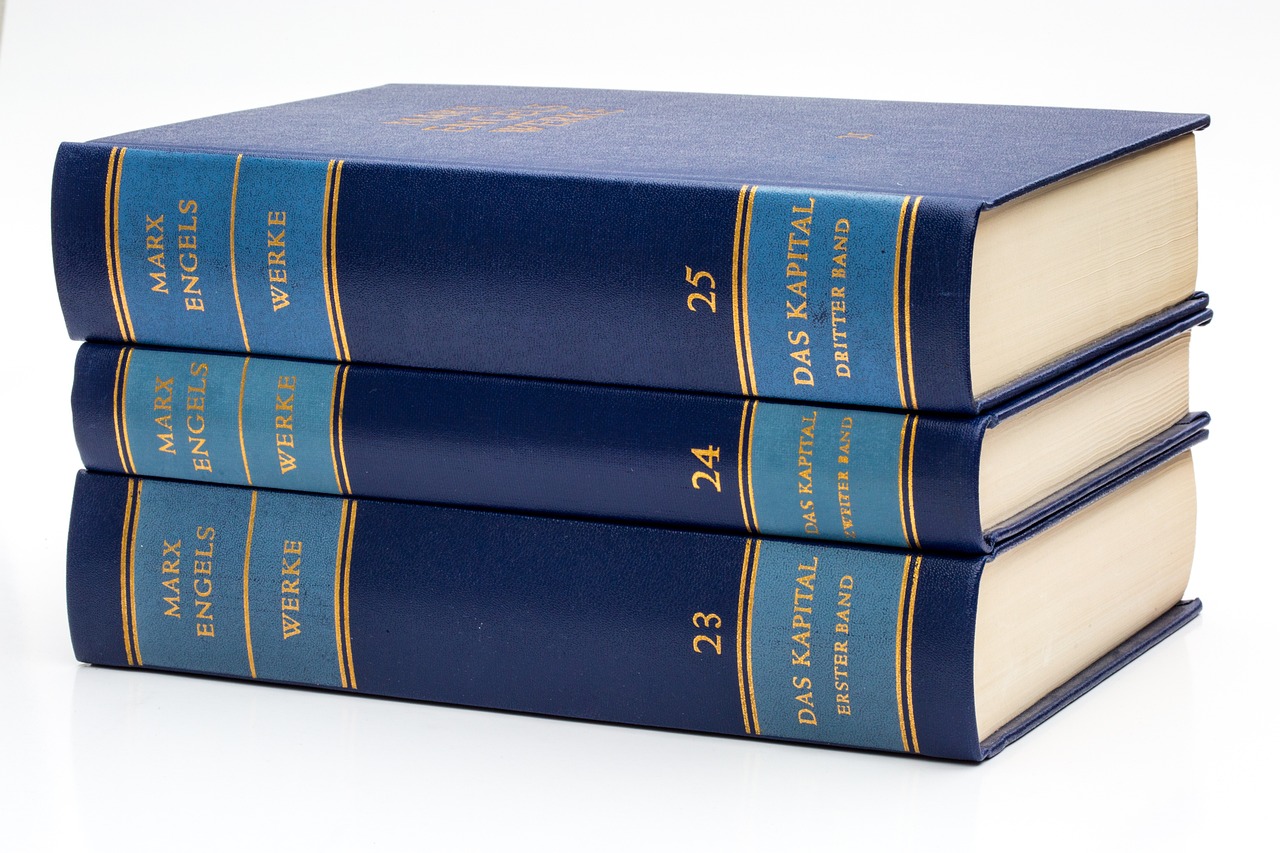
The Pursuit of Meaning
The quest for meaning is a deeply personal journey that resonates with many of us, and Alain de Botton offers profound insights into how we can navigate this complex landscape. In a world where distractions abound and societal pressures often dictate our paths, de Botton encourages us to embark on a thoughtful exploration of what truly matters in our lives. He posits that finding meaning isn't merely about achieving goals or accumulating wealth; rather, it's about understanding our values, passions, and the impact we wish to leave on the world.
To illustrate this, consider the metaphor of a garden. Just as a gardener carefully tends to their plants, nurturing them to flourish, we too must cultivate our own lives with intention. This involves not only planting seeds of ambition but also regularly weeding out distractions and negative influences that hinder our growth. De Botton emphasizes that the pursuit of meaning requires us to engage in self-reflection and to ask ourselves challenging questions, such as:
- What brings me joy?
- What are my core values?
- How do I want to contribute to the world?
Moreover, de Botton argues that the pursuit of meaning is often intertwined with our relationships and experiences. He suggests that meaningful connections with others can significantly enhance our understanding of ourselves and our purpose. The stories we share, the love we give, and the challenges we face together all contribute to a richer tapestry of existence. By engaging with others on a deeper level, we can uncover insights that might otherwise remain hidden in the noise of daily life.
In addition to relationships, de Botton highlights the importance of experiential learning. He believes that stepping outside our comfort zones and embracing new experiences can lead to profound personal growth. Whether it's traveling to a new country, trying a different hobby, or volunteering for a cause we care about, these experiences can help us discover passions and interests that we never knew existed. This exploration can be likened to a treasure hunt, where each new experience is a clue leading us closer to our true selves.
Ultimately, the pursuit of meaning is not a destination but a continuous journey. De Botton reminds us that it's perfectly okay to feel lost at times. In fact, moments of uncertainty can often be the catalysts for profound insights and personal transformations. By embracing this journey with an open heart and mind, we allow ourselves to evolve and adapt, discovering new layers of meaning along the way.
In conclusion, Alain de Botton’s philosophy encourages us to take an active role in shaping our lives and finding meaning in our everyday experiences. By reflecting on our values, nurturing our relationships, and embracing new challenges, we can create a life that is not only fulfilling but also deeply meaningful.
Q: How can I start my journey to find meaning in my life?
A: Begin by engaging in self-reflection. Ask yourself what truly matters to you and what brings you joy. Consider journaling your thoughts or discussing them with trusted friends.
Q: Is it normal to feel lost while searching for meaning?
A: Yes, feeling lost is a common part of the journey. Embrace these moments as opportunities for growth and self-discovery.
Q: Can relationships help in finding meaning?
A: Absolutely! Meaningful connections with others can provide insights and support, enriching your understanding of yourself and your purpose.
Frequently Asked Questions
- What is the main focus of Alain de Botton's philosophy?
Alain de Botton's philosophy centers around making complex ideas accessible and relevant to everyday life. He emphasizes how philosophical insights can help individuals navigate personal challenges, relationships, and the pursuit of happiness.
- How does de Botton view the role of philosophy in our daily lives?
De Botton believes that philosophy should not be confined to academic discussions; instead, it should serve as a practical guide. He argues that philosophical reflections can provide clarity and direction when dealing with modern life's challenges.
- What insights does de Botton offer regarding love and relationships?
De Botton explores the complexities of love, suggesting that understanding its philosophical underpinnings can help individuals navigate romantic relationships more effectively. He emphasizes the importance of emotional intelligence and empathy in fostering deeper connections.
- How can emotional intelligence enhance our relationships according to de Botton?
Emotional intelligence is crucial in understanding ourselves and others. De Botton argues that philosophical insights can enhance our awareness of emotions, allowing us to manage interpersonal dynamics better and build stronger relationships.
- What strategies does de Botton provide for resolving conflicts in relationships?
De Botton acknowledges that conflict is a natural part of relationships. He provides philosophical strategies that encourage constructive dialogue and understanding, helping individuals address disputes in a way that fosters resolution and connection.
- How does de Botton define success in the context of work and career?
De Botton challenges traditional notions of success, urging individuals to redefine it based on personal values and aspirations. He believes that finding meaning in one's professional life is essential for overall fulfillment.
- What does de Botton say about happiness and fulfillment?
Happiness is a central theme in de Botton's work, where he explores its philosophical dimensions. He suggests that true fulfillment comes from aligning our actions with our values and cultivating a sense of purpose in our lives.
- How can individuals cultivate a sense of meaning in their lives?
De Botton emphasizes the importance of thoughtful reflection and action in the pursuit of meaning. He encourages individuals to explore their passions and values, which can guide them in creating a more purposeful life.



